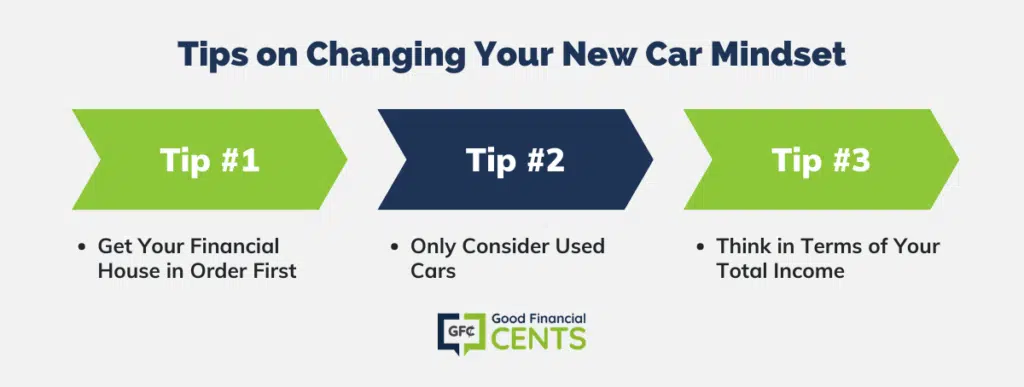All across the nation, families are struggling to get ahead. For some, the rising costs of healthcare chip away at their gains.
For others, stagnating wages and college bills are a real problem. Then there are those who claim raising kids makes it impossible to grow wealth.
No matter where you go, you’ll hear stories of hardship – many of which are out of our control.
But what if I told you some financial pain in this country is self-inflicted?
What if I told you one financial decision, in particular, has been absolutely catastrophic for people of every income?
What if I suggested one simple change that could turn your finances upside down (in a good way)?
If you’re still reading this post, you asked for it.
Brace yourself; you might not like what you’re about to hear.
Table of Contents
The One Monthly Payment Killing Your Wealth
The average car payment in the US is now $499. That is straight-up stupid. That much invested would be over $5M at retirement.
– Dave Ramsey (@DaveRamsey)
According to a recent State of the Automotive Finance Study from Experian, the average new car payment reached $499 per month last quarter. Worse, the average new car loan is 68 months long!
Like my man Dave Ramsey says, it’s entirely preposterous when you really think about it. Have you ever imagined what you could do with an extra $499 per month?
Let’s face it: probably not.
These days, we blame everything but our car payments for our inability to get ahead. We blame our employers for not giving us the raises we deserve or our parents for not educating us enough.
We blame health insurance premiums, the price of groceries, the housing market, and even the price of gas.
But do we ever throw shade at our car payments?
Heavens no.
Somewhere along the line, we’ve become socially conditioned to believe a huge car payment is a fact of life. We tell ourselves that everyone has a car payment and that it’s normal and okay.
And heck, if we’re going to have a car payment, we might as well get the car we want, right?
This kind of thinking is so widespread it’s practically an epidemic. The thing is, it’s also absolutely wrong….and it’s killing our wealth.
Why the $500 Car Payment Is a Bad Idea
I’m not saying all car payments are bad, as there are certain situations where a loan makes sense.
Perhaps you really needed a new car under warranty and saved up a large down payment to make it happen. Or maybe you planned on buying a new car with cash but chose financing to secure a sweet 0% APR financing offer.
But let’s face it – these situations aren’t normal. While each situation is unique, the vast majority of people aren’t helped by their ginormous car payments. In fact, a huge monthly payment might be the one thing preventing them from building wealth.
Think about it this way.
Imagine you started your first job at age 25 and settled on a $499 car payment for your entire adult life.
You would trade your car in over the years, but you would always have that payment. Each time you paid a car off, you would head straight to the dealership to pick up a new one.
If you did this for thirty years, you would fork over $179,640 in car payments!
And in the end, you would only have an older car worth almost nothing to show for it. Worse, this figure doesn’t include the extra money you’ll pay to insure and register a brand-new car as opposed to a used one.
Now, imagine you did something radical. You forgo a new car for your entire life and drive older, paid-off models the entire time.
Instead of spending $179,640 in car payments over thirty years, you limit yourself to spending $30,000 total on cars instead.
The kicker with this scenario is you invest all of the extra money instead. (I did this with an inherited Chevy Lumina, and became $2 million dollars wealthier in the process!)
If you did this – and invested around $1,000 less per year to save up the $30,000 for a lifetime of car replacements – you would have $394,335.91 after thirty years with just a 6 percent annual return.
If you earned 8 percent on your money over those thirty years, you would turn 55 with $565,047.59!
Remember, this is easy money, people. Instead of paying that car payment, you would either:
- Boost contributions to your work-sponsored 401(k) account by $415 per month (the $499 car payment – $5,988 per year – minus $1,000 per year for car replacement)
- Add an additional $415 per month to your SEP IRA or Solo 401(k) if you’re self-employed
- Open a Roth IRA and fund that baby with $415 per month for thirty years
- Invest $415 per month in a taxable account if you’re maxing out retirement already
Why Doesn’t Everyone Do This?
The numbers don’t lie. When we are willing to forgo a new car every year, it becomes so much easier to build wealth.
So, why don’t we?
According to some of the financial advisors I’ve spoken to, it all boils down to poor planning – and a lack of awareness.
As Minnesota Financial Advisor Jamie Pomeroy notes, people are conditioned to gauge affordability based on a monthly payment – not on the overall costs of a car or even the long-term financial consequences.
People tend to think, “I can afford this monthly payment,” without asking themselves the right questions. In reality, we should be asking ourselves if we can truly afford a $30,000+ car that will depreciate the second we pull off the lot.
Portland financial planner and the founder of Three Oaks Capital Management Grant Bledsoe says it’s also a matter of instant gratification.
“If you want that shiny new Audi your neighbor just bought, you can head over to the local dealership and walk out a few hours later with your own A6,” says Bledsoe.
“For most people, it comes back to keeping up with the Joneses,” notes Kansas City Financial Planner Clint Haynes. “If your neighbors and friends all have fancy new cars, then the mindset is to get one for yourself.”
People also figure they can figure out the monthly payment later, he says, even if they have to stretch the payment up to 84 months upfront.
At the end of the day, new car purchases are killing us no matter the reason behind them. That’s why families struggling to get ahead need to change their new car mindset – once and for all.
But how?
Changing Your New Car Mindset
As we already pointed out, the big issue here is learning to delay gratification. It’s easy to see why people love their new cars no matter how much they cost. As San Diego Financial Planner Taylor Schulte says, “Buying a new car is fun.”
Not only do you get to enjoy that coveted “new car smell,” but you get to look fancy in front of your colleagues and friends. And no matter how much the privilege costs, it feels soooooooooooo good to drive your new car off the lot and cruise down the street.
Unfortunately, that’s the short-term talking. That new car smell? The feeling you get when you drive to dinner in your brand-new ride?
Those feelings are temporary; they’re fleeting. After a fairly short amount of time, the new car excitement turns into a mundane, uneventful reality. Once your car isn’t new anymore, it’s just something you drive to your kid’s soccer practice.
If you want to do something different and get absolutely rich in the process, you have to change your new car mindset. Here are some tips that can help you find a better deal on a car – and grow your wealth at a much faster pace:
Tip #1: Get Your Financial House in Order First.
“If the foundation of your financial house is not in order, getting into a high car payment or lease should be the last thing you consider,” says financial advisor Jamie Pomeroy.
Have 6-9 month’s living expenses saved up as an emergency fund? Are you free of consumer debt? Are you maxing out your Roth IRA or contributing to your employer’s 401(k) at least up to their matching point?
“If not, avoid that high car payment at all costs,” he says.
Tip #2: Only Consider Used Cars.
“If you must buy, buy used!” says Jose V. Sanchez, financial contributor for LifeInsuranceToolkit.com. “The National Automotive Dealers Association believes that used car prices will drop on average 2.5% each year over the next few years.
Meanwhile, new car prices continue to rise. If you are in the market for a vehicle and looking for a good deal, now may be the best time to buy used.”
“Search for a certified pre-owned model with highly-rated dependability and check Consumer Reports for the most up-to-date information,” says Schulte. “As a general rule of thumb, the purchase price of the car shouldn’t exceed 10-15% of your annual income.”
Tip #3: Think in Terms of Your Total Income.
If you need to talk yourself out of a new car purchase, Financial Planner for Physicians Andrew McFadden says to remember the big picture.
“If the average household income in the U.S. is around $52,000 per year (2013 census), then a $500/month car payment represents 11.5% of your income!” he says. “If you throw in gas and maintenance, your transportation bill could easily be 15-20% of your total pay.”
With your mortgage payment taking another 25% of your income taxes, claiming another 25-30%, that leaves you with maybe 30% for everything else.
The lesson here?
No matter how much you make, $500 per month is a huge chunk of money that shouldn’t be taken lightly.

The Bottom Line- GFC 076: Wealth-Draining Monthly Payments
If you work hard and still can’t get ahead, your car payment might be the culprit of your money woes.
Before you head to the dealership, you should ask yourself if that new car smell is worth losing out on $179,640 over the next thirty years – or up to $820,483 in investment returns.
Chances are, it’s not even close.
What is your take on car payments? How do you decide how much to spend on a new or used car?








In my recent car shopping I have found that the prices for recent model year (1-3 yr old) certified pre-owned vehicles I am interested in (highly rated SUV for hauling around a four person family) cost 80+% of the price of a new car. Sure, the older the car you look to buy the cheaper the purchase price, but where does the higher risk of major maintenance and repair costs factor in? I prefer to buy new and drive it until it breaks.
Hi Ryan – You’re asking a good question. If you’re saving at least 30-40% buying used, the answer is more obvious. But 20% is really a gray zone. You’re probably looking at high demand vehicles, and the discounts on those aren’t as generous. You really have to go with your gut here. If you plan to drive the car for a lot of years – until it breaks as you say – you may be better off buying brand new. It’s a tough call.
I’m ALL about buying used and buying cheap (as long as it’s reliable!). For me, my monthly payment that’s killing me is actually my student loans! Too bad there’s no collateral on that one, or else I’d definitely trade it in! 😉
That’s an excellent point Natalie. Student loans are like car loans – but often much larger – and there’s nothing to sell to pay them off. You really have to have a long-term strategy for that one, and plenty of patience and resolve.
For the longest time I only drove used cars. I didn’t have a car payment and life was good.
Then my brother in law started to work for a car company and I was able to get a leased vehicle with maintenance, better insurance and unlimited mileage for less than the insurance and maintenance that I would pay on a used car. On top of that I got a new car every year.
I made the switch after running the numbers. If it ever changes in the future I will re-evaluate but for now it makes financial sense to have a car payment 🙂
The lease idea works for you because you have a “preferred arrangement” though your brother-in-law. But I wouldn’t recommend it for everyone. The problem with a lease is that you ALWAYS have a payment and you NEVER own the car.
You know suddenly driving an old bronze 2003 Honda Accord doesn’t seem that bad after all, yea that’s what I drive. At least it doesn’t have a payment plan ha!
Hi Lila – A lot of people focus on how old their car is, or what ever the problems with it are. But if you think more about what you gain by not having a later model car – with a monthly payment – the old car isn’t so bad any more.
Wow! Thankfully the car payments I’ve had in the past have been nowhere near $500. This is some eye-opening math you present here — hopefully more people will wake up to how insane spending that kind of money on a car payment is.